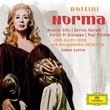| All Artists: Beverly Sills Title: Sillsiana Members Wishing: 1 Total Copies: 0 Label: Gala Release Date: 2/23/2010 Album Type: Import Genre: Classical Style: Number of Discs: 2 SwapaCD Credits: 2 |
Search - Beverly Sills :: Sillsiana
CD DetailsSimilar CDs |
CD ReviewsSillsiana Sizzles And Delights Rudy Avila | Lennox, Ca United States | 09/11/2004 (5 out of 5 stars) "There was never a soprano like Beverly Sills. She was born with a spit bubble in her mouth and the doctor nicknamed her "Bubbles". As a child, she appeared on radio and in one rare film, singing opera. Her talent for lyric coloratura was detected early and she was trained by the last pupil of Matilde Marchesi, Estelle Liebling. She sang many opera repertoires for years without being "discovered"- among them all three heroines in Mozart's Don Giovanni- Zerlina, Dona Elvira and Dona Ana, Micaela from Carmen, Marguerite from Faust, the title role in Lehar's The Merry Widow, even heavier roles like Andrea Chenier, Aida and a Valkyrie in Wagner's Die Walkure. She married Peter Greenough, a journalist and had two children with him, a girl, Muffy who was deaf and a son who was autistic. Beverly Sills would become one of the leading champions for The March Of Dimes in the struggle for prevention of birth defects. Not even the beautiful and enchanting "Ballad Of Baby Doe" by Moore was enough to get her noticed. It was not until the 60's that she rose to fame, beginning with her performances at the New York City Opera- the role was Cleopatra in Handel's Julius Caeasar. After the acclaimed performance, she traveled across Europe to the major opera houses- she sang the Queen of the Night (the first aria O Zittre Nicht is featured in this album) in Vienna, she sang Lucia Di Lammermoor at London's Covent Garden, Pamira from Rossini's L'Assedio Di Corinto in La Scala, Violetta in La Traviata was a role she overdid- singing it frequently in the US and her greatest performances have been credited as Jules Massenet's Manon and the Tudor Queens of Donizetti's operas- Anna Bolena, Maria Stuarda and Queen Elizabeth in Roberto Devereux. It was her Queen Elizabeth that earned her a cover in Time magazine's 1971 issue. Beverly Sills had become a household name. Beverly Sills brought joy to her performances- she had a passion for her profession. She was never pretentious. She made opera fun, accessible and worthwhile. She could get dramatically committed into the serious roles and she let go and had fun with the sillier, comic roles, such as Rosina in Barber of Seville (Una Voce Poco Fa is included in this album) and most notably as Marie in Donizetti's La Fille Du Regiment. She was opera's greatest embassardor, spending years after her retirement as a spokesperson for the arts, appearing in television, hosting concerts and operas, among them the Live From Lincoln Center airing on PBS. The selections on this live recording (never mind the fact that Sillsiana is a vainglorious title, which was not even Beverly Sills' idea but her vocal coach Roland Gagnon who wrote the last track's Sillsiana, a funny, dazzling display of coloratura classic arias which Sills sung one after another. The live audience is laughing as they recognize every aria- from Zerbinetta in Strauss' Ariadne, to the Queen in Rimsky Korsakov's Le Coq D'Or, the Queen of the Night in Mozart's Magic Flute, Manon, Lucia, Elvira from I Puritani, Olympia from Tales of Hoffman, a vocal ad lib to the Chopin Nocturne "Murmurs Of The Seine" No. 2 and the thrilling piece ends with Sempre Libera from La Traviata, spurred on when a tenor from the audience exclaims "Amor e Palpito" which are Alfredo's lines. The first cd covers Handel's oratorio Semele, which Sills sings beautifully in English without sacrificing the Baroque elaborate style. The role of Constanze of Mozart's Abduction From The Seraglio was another of Sill's lesser known but greatest hits. She sings dramatically and gorgeously in German in two arias from that opera. The 2nd cd covers arias from I Puritani and Ernani, as well as Juliet's Waltz Song from Gounod's Romeo and Juliet, Dinorah's Shadow Song from the Meyerbeer opera and the entire final act of Donizetti's Lucrezia Borgia, which Beverly Sills sings opposite tenor Henry Price. Lucrezia Borgia is a heavy role, a close cousin to Bellini's Norma. The role calls for fierce intensity,chest voice and high top register as well as lyricism and pianissimo. All of these things Bevely Sills delivers in the performance, providing with much of the same dynamics she sang Queen Elizabeth in Roberto Devereaux. It was roles like Lucrezia Borgia that may have shortened Sills' career. Note how she forces her voice in the lines "Un Borgia Sei !" when she announces to Gennrao that he is a Borgia. But Beverly would never regret singing these majestic diva roles, for they are beautifully done and equal to the more popular Joan Sutherland and Montserrat Caballe who sang the role of Lucrezia Borgia in the same period of time." Beverly Sills: The Rare Recordings..A Must Have Rudy Avila | 10/09/2003 (5 out of 5 stars) "Although "rare recordings" featuring particular sopranos is traditionally suited for that soprano's most hardcore fans, it's not necessary for you to be a fan of Beverly Sills to enjoy this rare recording "Sillsiana". Beverly Sills was "the people's soprano" and she made opera an American pasttime, accessible to everyone. Her stage performances in the 60's and 70's were often thrilling, entertaining, comical, engaging, dramatic, depending on the opera and its mood. Sillsiana was originally an LP in the 70's with the inscription- "A pastiche of comic arias". This is partially true. There are some "feel good" arias in here - such as The Queen of the Night's "O Zittre Nicht" from The Magic Flute, Dinorah's aria and Juliet's lively waltz aria "Je vous vivre" from Gounod's "Romeo and Juliet". Beverly Sills was not only a vibrant coloratura singer who could master challenging vocal trills, scales, leaps and high-flying roulades. She was not only a soft, sweet-voiced singer who depended only on the microphone to strengthen her voice, she was a one-woman show. She could either move you to tears as in the final scene of La Traviata or make you laugh your head off as in her performance as Marie in Donizetti's La Fille Du Regiment. Her voice, despite the fact that it is smaller and lighter than the numerous "divas" of the opera industry (Maria Callas, Joan Sutherland, Jessie Norman, etc) can convey just as much power and drama as any big-voiced diva. Beverly Sills was a diva, the people's diva. She made opera so much fun you would'nt think it was opera at all but more of an event.As mentioned, this recording features Beverly's more "fun" arias- The Queen of the Night, which she first performed in Vienna in 1969, and the bubbly Juliet from Gounod's Romeo and Juliet. However, the recording ends with the entire final act of Donizetti's "Lucrezia Borgia". Although the role calls for a heavy voice and many dramatic sopranos have tackled the role, including the forementioned Joan Sutherland and others such as Montserrat Caballe, Beverly manages to sound furious and despairing and dramatic as any of them. Her Lucrezia Borgia is sensational. It is proof that she could master both light opera as well as the bigger stuff. In the 70's, Beverly tackled such "heavy" roles as Bellini's Norma, Queen Elizabeth from Donizetti's Roberto Devereux and in concert even arias from Aida and Brunhilde from Wagner's "Die Walkure". Although Beverly admits to damaging her voice, she certainly thought it was worth it and so did her audience. She went out in a blaze of glory and left us the legacy that is her art." The woman is amazing. D. Fair | Baltimore, MD | 08/19/2003 (4 out of 5 stars) "This CD set is a gem. I have never heard the baroque arias sung with such vigor and technical know-how. The technique with which she uses to sing these is mind-bogling to me because no other singer that I know of even comes close to it. How she would think to use such a technique is beyond me. Her trills are tight knit and firing off like a machine gun. She uses lightning fast staccati and uses scales and runs like none I've heard. What a force to be reckonded with! And all of this with her sweet soft voice. Her "O Zittre Nicht" is the only rendition I have heard where the singer actually sounds angry. Sills has said that the Queen of Night was the most boring, pointless role she ever sung. The Queen of the Night sings an aria in Scene 1 of Act 1, and then sings another aria in Scene 3 of Act II. Between arias, the singer sits backstage for at least an hour and a half. So I'm sure that she absolutely had to give it all the acting she could muster up or else drive herself crazy. She describes this role as the " 'impersonal, mechanical' kind," according to her second autobiography. The Dinorah aria and Roméo et Juliette arias are also enjoyable highlights. The whole Lucrezia Borgia scene is frighteningly good. Such intensity in the drama. Sills has said that she would sacrifice any pure tone to make a dramatic point. And that she does! That is what I call a real singer. As opposed to another famous singer, where she ended her fabulous career doing just that, Sills' technique was so amazing, that even when she was singing high chest tones, it STILL sounded good. Sills -- what a talent. Their never will be one like her again."
|




